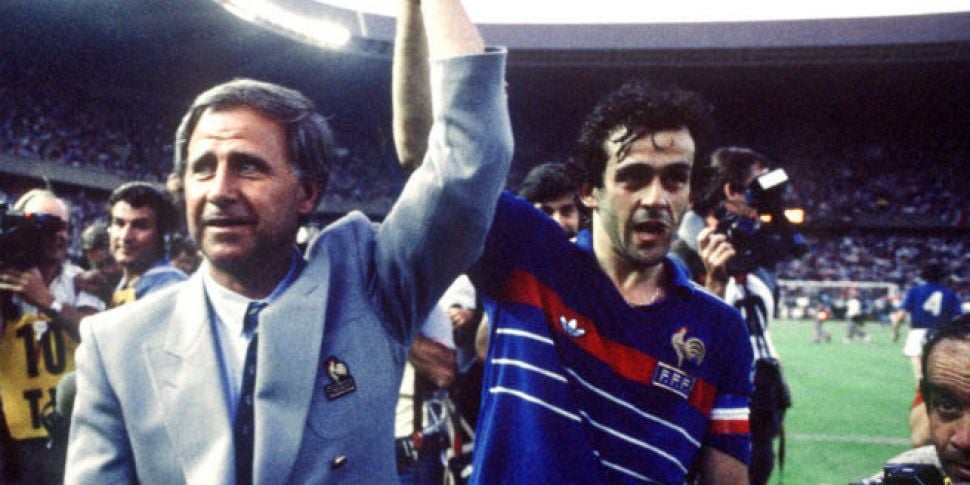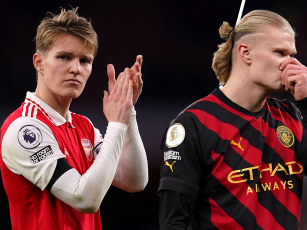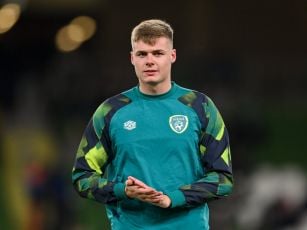Even if Zinedine Zidane hadn’t butted Marco Materrazi like a stag in the 2006 World Cup final, the France legend would still have been the definitive star of the tournament.
Having been persuaded back from international retirement, Zizou appeared revitalised and inspired the French through group stage clashes against Spain, Brazil and Portugal, before losing his head - or using it in the most direct way - against the Italians in the decider.
The perception was that Zidane and some of his most senior colleagues had effectively coached and dragged themselves to the final in Berlin in spite of unpopular former manager Raymond Domenech.
It is a legacy which clearly rankled with the coach even if he appears to have come to peace with it. In a recent interview with The Guardian, he said: “You can’t escape that when you have a great player. All Michel Hidalgo heard for this whole life was: ‘Michel Platini ran that team’. Every manager who ever had Cruyff had to put up with people saying: ‘Cruyff is in charge of this team, he takes the training sessions, does the team talks, everything’.
"You can’t escape it. There’s no point fighting against it."
The Hidalgo he refers to is the man who managed France to their first ever senior international tournament victory in 1984 when Platini was the star man as Les Bleus got their hands on the Euros.
He took over the France side in 1976 at a time when they struggled at international level. Indeed, the country had not been to a major tournament since the Euros of 1960.

France team group against West Germany in 1982: (back row, l-r) Marius Tresor, Jean-Luc Ettori, Gerard Janvion, Manuel Amoros, Maxime Bossis, Jean Tigana; (front row, l-r) Dominique Rocheteau, Bernard Genghini, Alain Giresse, Michel Platini, Didier Six
There is an excellent English-language documentary charting the rise, fall and rise of French football called More Than A Game which sees cultural historian Dr Andrew Hussey make an interesting observation about the French football psyche.
"There's always been a conflict in French football culture. Should we win or should we go out and play brilliantly?""
They tended to do the latter more often than not.
But in the late ‘70s, a new generation emerged which was harnessed by Hidalgo and would become synonymous with flair and ultimately a measure of success.
Platini would receive his first national team call up in 1976 at the age of 21 in Hidalgo’s first match in charge at a time when they began to qualify for tournaments again.
Having played at the 1976 Olympics, the French football team would then qualify for the 1978 World Cup from a group including Ireland, ending a 20 year absence.
Their stay at that tournament in Argentina would be short as they were knocked out of a group including Italy and the host nation.
But it would a first taste of major tournament football for Platini and his fellow midfield partner Alain Giresse with the former scoring in a 2-1 defeat to Argentina.
They would miss Euro 80, but would then qualify for the 1982 World Cup, which would become part of the great learning experiences for the side.
By then Le Carré Magique (Magic Square) had begun to take shape in France’s midfield as future Fulham manager Jean Tigana and youthful Paris Saint-Germain star Luiz Fernandez were added to the Platini-Giresse mix.
Essentially the Carré Magique was a four-man midfield combining the style and vision of playmaker Platini, the ball-winning ability of Fernandez, Tigana’s box-to-box qualities with the diminutive Giresse’s energy which to this day is still regarded as one of the great engine rooms.
Arriving in Spain for the ‘82 World Cup, they were in the full knowledge that the European Championships two years later would be on home soil.
Their first match against England in Bilbao was a setback as the opposition captain, Bryan Robson, scored within one minute of play.
Gerard Soler equalised for France midway through the first half but Robson put England back in front again after the break in an eventual 3-1 loss for Les Bleus.
The French bounced back in the following game to defeat Kuwait 4-1 with Platini scoring in Valladolid, before a 1-1 draw in the same city against Czechoslovakia proved just enough for them to edge through to the second group stage behind England.

France's Michel Platini (c) goes down under pressure, watched by teammate Jean Tigana (c) against Belgium in 1984. Picture by: Peter Robinson / EMPICS Sport
Pitted against Austria and Northern Ireland in that second stage, France won both games 1-0 and 4-1 respectively at Madrid’s Vicente Calderon with Giresse scoring twice in the latter match.Thus they were through to their first World Cup semi-final since 1958.
For a football nation which had a reputation for style over substance, they would meet the opposite in West Germany.
The German national team of today may be world champions, but they play an attractive brand of football.
But for so long, their reputation in the outside world was one of ruthless efficiency. That would be evident in that infamous semi-final which Platini regards as “his most beautiful game” but is remembered for a horrific challenge from West German goalkeeper Harald Schumacher in extra-time.
Platini scored a penalty in the Andalusian city of Seville as France and the Germans played out a 1-1 draw in normal time. They had saved all the drama for the 30 minutes and shootout.
Legendary defender Marius Tresor and Giresse put France 2-1 and 3-2 up, but each time Die Mannschaft found a way of clawing their way back into the game.
But Schumacher’s action of taking out France defender Patrick Battiston by colliding with the player left the latter unconscious and deprived of some teeth. It also left a bad taste in the mouths of the French as Dutch referee Charles Corver failed to punish the keeper and Schumacher aggressively antagonised the French crowd and players.
Rattled, France lost that penalty shootout and with it the chance of a first ever World Cup final.
To this day, that semi-final would live on in infamy as one of the greatest major tournament games ever played.
The semi-final the French would be involved in two years later would also be regarded in a legendary light but with a different outcome.
More significantly for France, they were on home soil as Euro 84 began, qualifying automatically as hosts. By then, Platini had already moved to Juventus and endured a rocky start in one of the strongest leagues in the world before finding his feet. He was the only foreign-based star in the squad for the tournament with Battiston (having recovered from the Schumacher collision), Tigana, Fernandez and Giresse all playing club football in France.
Even more significantly, Battiston, Tigana and Giresse formed part of a five-man core who all played at Bordeaux, while AS Monaco provided the same number of players in the 20-person panel. However, the Bordeaux crew were arguably more important as Giresse and Tigana formed half of Le Carre Magique midfield behind a forward-line which often included a man from the same club, in Bernard Lacombe.
But aside from the West German teams of the ‘80s and early ‘90s, the most successful international sides seemed to blend a strong team with one outstanding talent who dragged the nation to glory.
In 1982 it was Paolo Rossi, 1986 was of course Diego Maradona, Marco van Basten volleyed his way into our consciousness in 1988 and if you stretch it out further, the Italians were in debt to Roberto Baggio in 1994, even he did sky his penalty in the shootout defeat to Brazil.
For France in 1984, it was all about Platini from the moment the tournament. Right in his peak years at the of 28, he scored the only goal of the game on the opening night of Euro 84 against Denmark. In a match in which he mixed silky touches with a willingness to get stuck into tackles if you look at the footage, he drove in a deflected shot from the edge of the box with 22 minutes to go to send the Parisian crowd wild and more importantly to kick things off with a win.
Momentum would not just be slow and steady into the second game against a Belgian side who had beaten Yugoslavia in their group A opener.
Platini would be majestic as his hat-trick, starting with a 4th minute opener, led France to a 5-0 victory in the Atlantic city of Nantes as Giresse and Fernandez added the other two goals for three-quarters of the Carre Magique to get on the scoresheet.
Like Platini, Tigana was also 28, while Battiston was a year younger. Fernandez at 24 and Giresse at 31 were at the further reaches of the footballing scale of peak ability and experience, but the fact that many of the squad members fell within that age bracket suggests a side at its very peak and it showed against Belgium spectacularly.
Watch highlights of the game and you see Tigana patrolling, Platini finding pockets of space to apply his X-Ray vision and playmaking ability, Giresse running the channels and the neat skills of Fernandez.
He and Platini combined cleverly for the first goal against the Belgians as the star man’s short free-kick sideways set up Fernandez to cannon a pile-driver off the bar from 25 yards. It would fall for Platini who would find the corner of the net with magnifique precision.
With France all but through before the final group game against Yugoslavia, Hidaglo’s team did not let up as they won 3-2 with Platini scoring his second hat-trick in three days and seventh goal in a week.
While Platini had helped the French breeze through the group, the semi-final against Portugal in Marseille four days later would be nerve-shredding.
Instead of Platini, Toulouse’s 26-year-old defender Jean-Francois Domergue, who had just one cap prior to the tournament, would take centre stage as he opened the scoring in the first half. Not only opening the scoring but smashing in a rocket of a free-kick on turf where Platini was normally the dead-eyed dead-ball deliverer.
But Portugal’s Rui Jordao, whose goal against the Soviet Union had helped his nation to Euro 84, equalised with 16 minutes thanks to some decidedly poor French marking to force France into extra-time in a major tournament semi-final yet again.
Eight minutes into extra-time, Jordao repeated the trick in front of the 54,000 crowd at the Stade Velodrome to leave France on the brink of an exit.
But shortly after Portugal missed a one-on-one chance that would have surely ended France’s hopes, Domergue would rise again, this time pouncing on a loose ball after drifting into the box as Platini and Giresse probed and prodded the Portuguese defensive siege.
With Domergue having proved heroic, Platini would then step up for the winning goal in the final minute of extra-time.
Hitting Portugal on the break, Tigana surged into the box, first appearing one opportunity to play Platini through before running down the outside of his defender and finally pulling it back for his fellow Carre Magique colleague.
Six yards from goal, the ball fell at Platini’s feet. With two Portuguese defenders and the goalkeeper on the floor in front of the goal-line, France’s captain would not need to lift his shot over them to find the net and launch France into a first ever major tournament final.
Controlling it, he swivels and for a moment time stops.
Bang!
He turns and finds the net and makes it 3-2 to send the French players and the tricolours in the crowd visibly floating on clouds.
As John Motson said in his commentary of the game, "I’ve not seen a match like this in years!"
In some ways, that was the most important match of Euro 84 for France, even though they still had the final against Spain to come.
Unlike two years previously in the extra-time period against West Germany, they had found a way when the gauntlet was thrown down at them.
The Carre Magique itself assembled again one more time in that tournament in Paris against a Spanish side which had only reached the second round on home soil in the World Cup two years previously. But that nation had one thing France didn’t have - a European Championship in their trophy cabinet, having won it back in 1964.
Neither side could be separated in the first half. But on 54 minutes, Platini would step up one more time. It wasn’t the best free-kick he’d ever taken, but Spanish keeper Luis Arconada was still unequal to it as he spilled a rather tame effort and allowed the ball to briefly dribble over the goal-line as Czechoslovak referee Vojtech Christov awarded the 1-0 lead.
With that bit of luck, France held on despite having Yvon LeRoux sent off and still had time for Bruno Bellone (a Frenchman of Italian descent just like Platini) to race through and delicately chip Arconada for the second goal of the night and France’s first ever major trophy.
Platini would lift the trophy as captain to cap one of the all-time great individual showings at the elite level.
France v Spain: 1984 UEFA European Championship final highlights
He was named in the official UEFA team of the tournament along with Giresse and Tigana and had his name etched in history.
Manager Hidalgo, much like Aime Jacquet did after the Zidane-inspired 1998 World Cup final win, moved upstairs after that victory as Henri Michel took the reins for the ‘86 campaign.
Like Maradona in 1986 - a World Cup in which a Platini-led France would again reach the semi-final only to lose to those West Germans again - Euro 84 appeared to be about one player.
Download the brand new OffTheBall App in the Play Store & App Store right now! We've got you covered!
Subscribe to OffTheBall's YouTube channel for more videos, like us on Facebook or follow us on Twitter for the latest sporting news and content.








